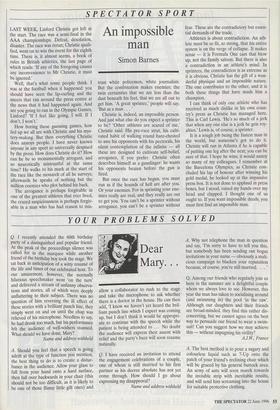SPECTATOR SPORT
An impossible man
Simon Barnes
LAST WEEK, Linford Christie got left at the start. The race was a semi-final in the AAA championships. Defeat, desolation, disaster. The race was rerun; Christie quali- fied, went on to win the event for the eighth time. There is, it almost seems, a book of rules in British athletics, the last page of which reads: `If any of the foregoing causes any inconvenience to Mr Christie, it must be ignored.'
Well, that's what some people think. I was at the football when it happened: you should have seen the lip-curling and the sneers that ran around the press centre at the news that it had happened again. And are you going to run in the Olympic Games, Linford? I feel like going, I will. If I don't, I won't.'
How boring these guessing games, how fed up we all are with Christie and his mys- tery-making. But then everything Christie does annoys people. I have never known anyone in any sport so universally despised by the press. How does Christie do it? How can he be so monumentally arrogant, and so neurotically mistrustful at the same time? He walks to his mark at the start of the race like the monarch of all he surveys; afterwards he speaks of nothing but the million enemies who plot behind his back.
The arrogance is perhaps forgivable in one of the greatest• athletes that ever lived, the crazed suspiciousness is perhaps forgiv- able in a man who has had reason to mis- trust white policemen, white journalists. But the combination makes enemies: the twin certainties that we are less than the dust beneath his feet, that we are all out to get him. `A great sprinter,' people will say. `But as a man . . . '
Christie is, indeed, an impossible person. And just what else do you expect a sprinter to be? 'Other athletes are scared of me,' Christie said. His pre-race strut, his culti- vated habit of walking round bare-chested to awe his opponents with his pectorals, his silent contemplation of the infinite — all these are designed to cultivate self-belief, arrogance, if you prefer. Christie often describes himself as a gunslinger: he wants his opponents beaten before the gun is fired.
But once the race has begun, you must run as if the hounds of hell are after you. Or your enemies. For in sprinting your ene- mies really are real, and they really are out to get you. You can't be a sprinter without arrogance, you can't be a sprinter without fear. These are the contradictory but essen- tial demands of the trade.
Athletics is about contradiction. An ath- lete must be so fit, so strong, that his entire system is on the verge of collapse. It makes sense — it is Formula One cars that blow up, not the family saloon. But there is also a contradiction in an athlete's mind. In sprinters, the contradiction is as extreme as it is obvious. Christie has the gift of a won- derful physique and an impossible nature. The one contributes to the other, and it is both these things that have made him a champion.
I can think of only one athlete who has received as much dislike in his own coun- try's press as Christie has managed here. This is Carl Lewis. `He's so much of a jerk that when any one else is a jerk he gets roy- alties.' Lewis is, of course, a sprinter.
It is a tough job being the fastest man in the world, but someone's got to do it. Christie will run in Atlanta if he is capable of putting one leg after the next; you can be sure of that. I hope he wins; it would annoy so many of my colleagues. I remember at the Barcelona Olympics, as Christie con- cluded his lap of honour after winning his gold medal, he looked up at the impassive press box. It is not done to applaud in press boxes, but I stood, raised my hands over my head and clapped. I thought one of us ought to. If you want impossible deeds, you must first find an impossible man.


























































 Previous page
Previous page